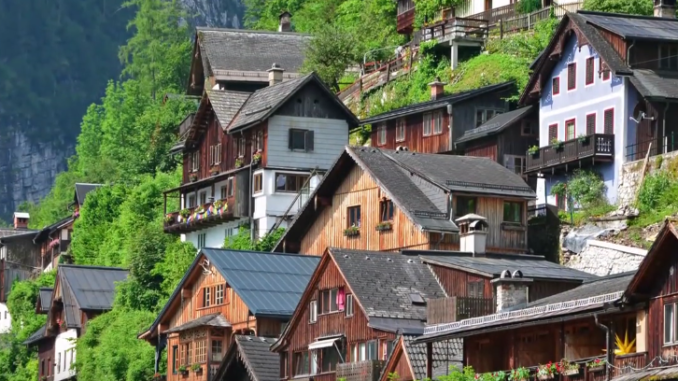
Hallstatt is a beautiful lakeside town in Austria. A UNESCO World Heritage Site, it is one of the most popular tourist destinations in the world. In the olden days, it was accessible only via a mountain trail or by boat. Now, tourists can take trains, buses, cars, cabs, and boats to reach this spectacular holiday destination. The town has around 800 residents and is home to a variety of tourist attractions.
Hallstatt – Weather (Best time to visit)
You can visit Hallstatt anytime you want, and it is a done thing that you will enjoy the place to the hilt. Since the place is located near the Alps, it is known to have an Alpine climate. The summer is from the months April to June with a temperature of 24 to 26 degrees, the winter is from October to March, with the temperature dropping to -3 degrees as well. The monsoon season can also be from October through March. If you love ‘chilling out’ in the winter and enjoying snowy visual delights, then the winter could be a good time to visit Hallstatt. But if you like hiking and would like to have clear skies, then you can go between April and June.
Hallstatt Attractions (Things to do)
2 days are enough to enjoy Hallstatt, but those two days are sure to make for a memorable stay in your mind, for years to come.
A few things to do in Hallstatt are listed below.
- Market Square: It is situated in the center of the town and is one of the major hot spots. The Market square is enclosed by remarkable architecture with the main attraction being a statute of the Holy Trinity. The place is replete with cafes, restaurants, bar, hotels, and several types of gift shops. The square is home to varied concerts and events all through the year, including the winter Christmas market and the traditional procession of Corpus Christi during spring.
- Kalvarienberg Church: It was constructed in 1711 and was later given in charity to the town of Hallstatt by a married couple who was childless and court secretaries by profession. The Kalvarienberg Church is a masterful work of baroque architecture. It is located on a nearby mountain called the Kalvarienberg, which offers a spectacular view of the town, the lake, and the landscape. The church was erected so as to provide a place of payer for the residents of the village, as well as a resting place for the couple after their demise.
- Museum Hallstatt: A number of important archeological artifacts were found in the town of Hallstatt and the surroundings during the 1800s. These special finds have been put up on display at the Hallstatt Museum which was built and opened to the public in 1888. The museum offers detailed information about the town’s rich history, right from its pre-historic Stone Age times to the present. Varied exhibits that were found in the nearby salt mines, the cemeteries and the burial grounds of Iron Age residents are on display at the museum.
- Archaeological artifacts: The artifacts on display at the museum are not the only ones that tourists can expect to see in Hallstatt. A number of archaeological finds were found by chance when a boiler room was being built below a sports shop. Tourists can check out these items for free during the opening hours of the store. Other vital discoveries that have been made in and around the town include almost 2000 graves belonging to the early Iron Age and late Bronze Age as well as the pre-historic local salt mines. The discoveries were of such great magnitude and importance that the word ‘Hallstatt’ is currently used to explain the main culture of central Europe during the early periods of Iron Age.
- The Salt Mines in Hallstatt: There is some evidence that indicates that the salt mine in Hallstatt was being used in the 15th This makes it the oldest one on the planet. It was in use for more than 300 years from the 1600s to as late as the 1960s. The mine was eventually shut down and has now been converted into a tourist destination with displays and information about the miners’ lives and mining history.
- The mine is located high over the village on the 1030-meter tall Salt Mountain. It can be accessed via a funicular railway or by cable car. Tourists will be mesmerized by the stunning views offered from Rudolfsturm/Rudolf’s Tower. It was a fortification constructed in olden times to guard against invaders of the mines. The tower has now been converted into an observation tower and restaurant.
- Tourists can hear the story about the Man in Salt, a preserved body that was found in 1734, take a trip to the Subterranean Salt Lake, and check out fascinating modern and ancient mining method displays.
- The Skywalk is a platform that offers incredible sights of the surroundings and has a steep drop of 350 meters with the town located directly below.
- Children will particularly enjoy the underground Mega slide which is the longest wooden slide in Europe.
- Michael’s Chapel and the Charnel House: The Charnel House, located in two-storied Michael’s Chapel, has existed since the 1300s and is home to 1200 skulls. 610 of these skulls have death date inscriptions and paintings and have been sorted as per their family. This tradition began in 1720 after the cemetery did not have any space left. The bones were taken out from the graves 10 to 15 years after the death, bleached under the sun, painted with flowery designs, and then placed in the Charnel house. The chapel has baroque architecture.
- Church of Christ: The Patent of Tolerance was adopted by Emperor Josef II in 1782. This allowed freedom of religion in the Austro-Hungarian kingdom. A lot of Protestant people became residents of Hallstatt since then. A prayer house, without bells or tower, was constructed by the local Protestants in the 18th century as they did not have their own church. A striking rectory featuring bells and a church tower was built by the parish 60 years later. This much-photographed popular building is known as the Church of Christ.
- Lake Hallstatt: It is a pristine lake, 125 meters deep, that joins the 3 nearby small towns of Bad Goisern, Obertraun, and Hallstatt. In the olden days, it was the only and most important method of mined salt transport. Now, it has become a big tourist hot spot and people from all over the world come to soak up the beauty of the clear tranquil waters and the surrounding majestic mountains, swim in it, or enjoy a peaceful and visually captivating boat ride. Check out Hallstatt lake with pictures in greater detail.
- Dachstein Ice Caves: It consists of a network of cavers that are nearly 1200 meters deep, with the Eastern Alps being the most impressive of them. Tourists can visit the Mammuthöhle/Mammoth Cave made up of pipe-shaped large galleries created by an ancient underground spring/river; the Rieseneishöhle/Giant Ice Cave which has spectacular frozen walls, several great caverns, and occasional music concerts; and the 5fingers glass-bottomed viewing platform that juts out from a rock at a height of 400 meters above ground.
Hallstatt – Pictures
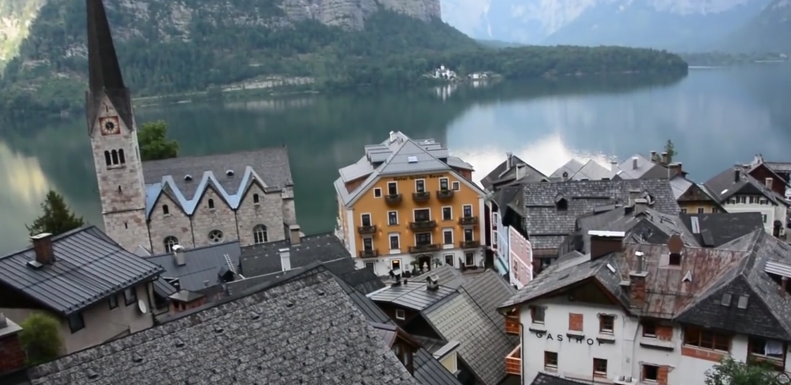
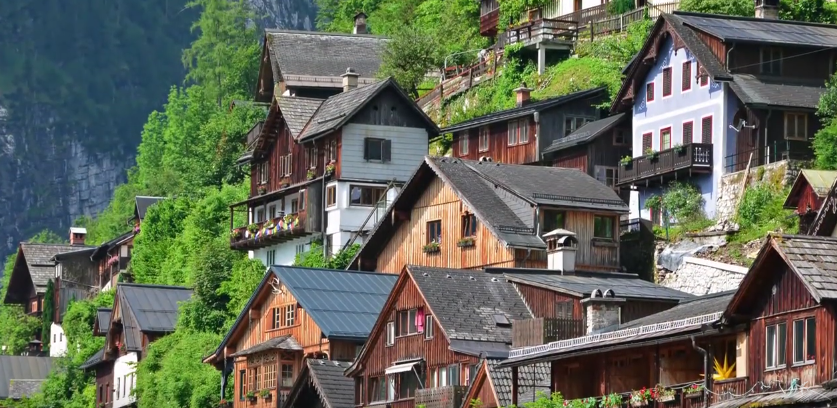
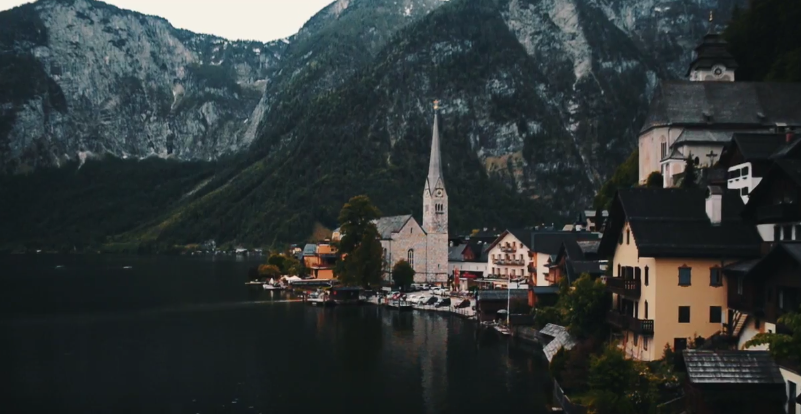
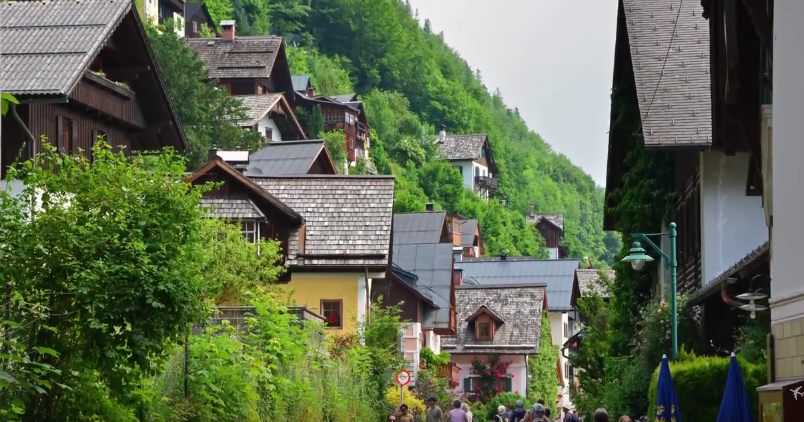
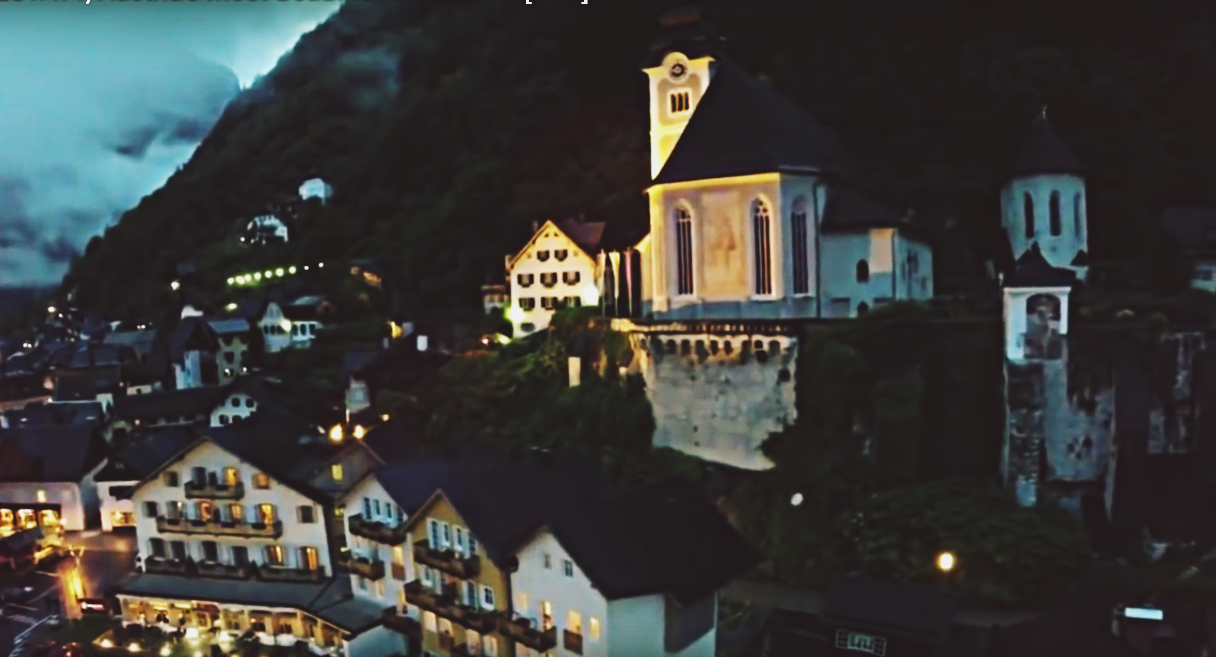


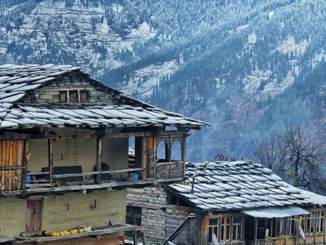
Be the first to comment